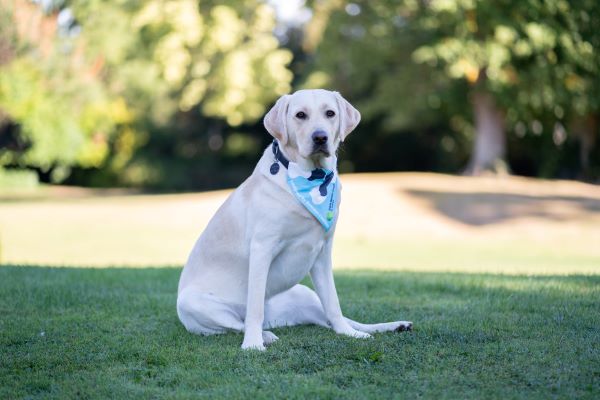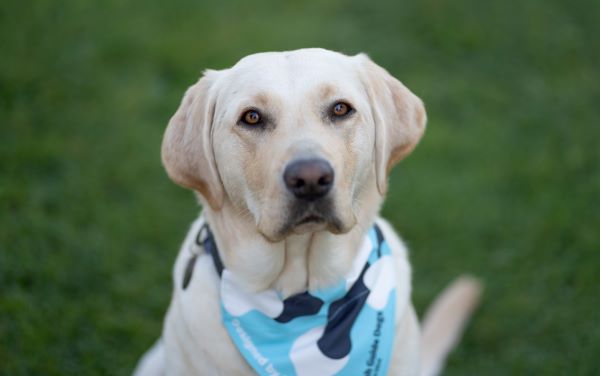Meet Ulreeka, the Community Dog at Dunboyne College of Further Education
Dunboyne College of Further Education is one of the largest colleges of Further Education in Ireland and the largest in its region. Currently, there are over 1000 full-time students, 100 part-time students and up to 500 students who are completing courses via their employers.
The college offers an inclusive and welcoming learning environment that acknowledges and values the unique identities and experiences of all individuals, providing necessary support and resources for students to succeed and thrive.
The Learning Hub
The Learning Hub (LH) is one of the services available to full-time students. The Learning Hub ensures a safe and accessible physical environment for 216 registered students with disabilities, learning difficulties, and ongoing health conditions. Students receive Academic support, IT skills support, assistive technology, exam supports, access to Guidance counselling, the Sensory Room and Ulreeka, the DCFE Community Dog.
The idea of getting a community dog was born out of the desire to support students with educational needs. We wanted to create a relaxing environment, which would be particularly beneficial for students with learning difficulties. The community dog would provide companionship, promote social interaction, and help to reduce stress and anxiety levels. Research demonstrated that interacting with dogs could have a positive impact on mood, reduce stress and anxiety, and improve socialisation skills.
I discussed the idea with the Principal, Denis Leonard, and Deputy Principal, Emer Cloak, to see if they were on board with getting a community dog. We talked about how we, along with the college, would work together to support the community dog in the best way possible. I also researched recognised charities that could work in partnership with us to provide such a service to the students in the college. We got in touch with the Irish Guide Dogs for the Blind, who had just launched the Community Dog Programme, who were fantastic to work with. They informed us of how the process would work, and we conversed across Teams and emails at first, as the pandemic had hit. I provided information on why we wanted a community dog, as well as details on myself to make sure that I would be an appropriate handler and details on the college facility and my house.
How we accessed the Community Dog Programme
Eimear Kenneally from the Irish Guide Dogs for the Blind came up to the college to see if the facility and my house were suitable and that they would provide a safe space for the community dog. In June 2022, I went to Cork to complete training with the Irish Guide Dogs for the Blind to make sure that I would have all the appropriate skills to take the best care of the dog. Thankfully, I was successful with the training, so they told me that when a community dog was available, they would assign one to us. During my training, I worked alongside Ulreeka, a Golden Labrador who was one and a half years old at that time. She was such a pleasure to work with, and I learned about her routine, how to work with her, and also her habits. She is an intelligent, highly skilled, very scent-oriented dog and likes to go to bed early!
In early July, I was contacted by the Irish Guide Dogs for the Blind to let me know that Ulreeka had graduated from her training and was available to go to work. Eimear came up again, this time with Ulreeka, to give a final check on my home, meet my husband and daughter, and see if Ulreeka was happy with them. My daughter was only nine months old at the time, and they instantly fell in love with each other. Ulreeka stayed a night to see how we would all get on together, and it was a wonderful experience. Ulreeka went back to Cork for a few weeks and came to live with us permanently at the end of July. Eimear came up to resume the training with myself, Emer, and Ulreeka, and this continued for a few weeks. We were now ready for the students that would be arriving in September for their academic year.
Implementing the programme
At Dunboyne College, we implemented policies and procedures for the care and management of Ulreeka, our community dog, and how she would interact with the students. We wanted to ensure that everyone had a positive experience with her, so we explained to the student body that Ulreeka would be on the premises five days a week and how they could interact with her while respecting her boundaries. We also invited them to inform us if they had any allergies to dogs or did not like them. While there were a few students who expressed such concerns, the overwhelming majority loved seeing Ulreeka in the college every day.
Through our booking system, students can access Ulreeka to sit and chill with her, watch her perform tricks, or groom her. She is stationed in the Learning Hub and roams freely, greeting students and accepting as many belly rubs as she can get. Ulreeka is highly intuitive and often sits beside students who are anxious, and some students have even booked sessions with her before assessments to help them ground themselves. She has even been a model for the art classes!
How the programme is working out - student and staff feedback
Ulreeka is booked into one-to-one sessions 3-4 times a week. She visits classes when students would need a boost. She would sit with between 30-40 students per day that would come into the LH each week for support. Each year she would visit all classes to introduce herself. She goes on walks around the college so that students can meet her outside of the classroom. One student stated that ‘she helps calm me when I get overwhelmed with assignment work’, and another said, ‘she just makes me smile anytime I see her. I am so happy that we have Ulreeka in the college.
Ulreeka is also beloved by the teachers who enjoy seeing her every day. Teachers have stated that ‘they couldn’t imagine the college without Ulreeka’. She has a ‘calming influence and comforting presence’. She has created an approachable environment and is a great icebreaker. Students are more comfortable coming into the Learning Hub. She has been a great conversation starter and allows students the confidence to discuss anything further.
Conclusion
From our experience so far, we would encourage more colleges to get access to the Community Dog programme, as Ulreeka has made such a huge impact on the lives of students and staff at the college. She has changed how students view getting support in college. The rewards of having Ulreeka at the college have surpassed our expectations. The Community Dog programme states to qualify for a dog, organisations must follow certain criteria. As mentioned above, there are assessments of the educational facility, the potential handler, and the handler’s home. The dog must live and sleep indoors and have an enclosed garden. There must be one main designated handler and that candidate must be available for training. Whilst it is a large responsibility, it is definitely worth it.
I would like to extend my gratitude to Dunboyne College for their continual support in this endeavour, to Irish Guide Dogs for the Blind and Eimear Kenneally for their ongoing training, advice, and support, and to Valerie Murphy for raising the most beautiful, kind, and intelligent Ulreeka!
I cannot express enough how appreciative and grateful we are to the Irish Guide Dogs for the Blind for the opportunity to have a community dog at Dunboyne College. They truly are an amazing charity. They put so much expertise, work, and love into every dog that is trained at their facility. We want to thank the volunteer puppy raisers and breeders who give up so much of their time to help mould and create such wonderful dogs.


